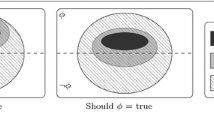Abstract
John Horty has proposed an approach to reasoning with ought-propositions which stands in contrast to the standard modal approach to deontic logic. Horty’s approach is based on default theories as known from the framework of Default Logic. It is argued that the approach cannot be extended beyond the most simple kinds of default theories and that it fails in particular to account for conditional obligations. The most plausible ways of straightening out the defects of the approach conform to a simple theory of default reasoning in standard deontic language.
Similar content being viewed by others
Notes
In what follows I shall proceed on the assumption that \(|\!\!\sim \) must be reflexive. But, as an anonymous referee for this journal has observed, there is a way out of the difficulties raised here, if we give up Reflexivity. If we excluded factual assumptions from the extensions of a default theory, then, first, \(|\!\!\sim \) would not be generally reflexive, and, second, plain facts could no longer occur on the right-hand-side of \(|\!\!\sim \) and thus enjoy property \(\phi \).
Prakken (1996, p. 78) poses the question: “Why not use default logic as it is, with the only change that the language on which it is based, first-order predicate logic, is extended with modal deontic operators?” In response he develops a version of the theory sketched here.
The two detachment principles are so difficult to combine that they may be used, as in Lower and Belzer (1983), to subdivide dyadic deontic logics into two distinct families; see also the survey papers (Åqvist 1984; Carmo and Jones 2002). Thanks to an anonymous referee for this journal for raising my attention to this point.
For a far more complete exposition of this intricate topic see Carmo and Jones (2002).
See Carmo and Jones (2002) for examples, a statement of the conditions for an adequate solution and a discussion of standard attempts at a solution.
Note that we have represented the schematic Chisholm-set in a default theory with a single extension. There is thus no reliance here on the hypothesis that the consistency of Chisholm-sets essentially depends on the defeasibility and indeed defeat of some of its members; see e.g. McCarty (1994). I take that hypothesis to be implausible for reasons explained in Prakken and Sergot (1996).
References
Åqvist, L. (1984). Deontic logic. In Gabbay and Guenthner (2001), pp. 147–264.
Brewka, G., & Eiter, T. (2000). Prioritizing default logic. In S. Hlldobler (Ed.), Intellectics and computational logic—Papers in Honour of Wolfgang Bibel, vol. 19 of Applied Logic Series. Kluwer: pp. 27–45.
Carmo, J., & Jones, A. (2002). Deontic logic and contrary-to-duties. In Gabbay and Guenthner (2001), pp. 265–343.
Frege, G. (1918). Der Gedanke. Beiträge zur Philosophie des deutschen Idealismus, 2, 58–77.
Gabbay, D. M., & Guenthner, F. (Eds.). (2001). Handbook of philosophical logic (2nd ed.). New York: Springer.
Hansson, B. (1969). An analysis of some deontic logics. Nous 3 , 373–398. Reprinted in Hilpinen (1981), pp. 121–147.
Horty, J. (2014). Norm change in the common law. Dordrecht: Springer Science+Business Media. ch. 15, pp. 335–355.
Horty, J. F. (1994). Moral dilemmas and nonmonotonic logic. Journal of Philosophical Logic, 23(1), 35–65.
Horty, J. F. (1997). Nonmonotonic foundations for deontic logic. In D. Nute (Ed.), Defeasible deontic logic: Essays in nonmonotonic normative reasoning (pp. 17–44). Dordrecht: Kluwer.
Horty, J. F. (2003). Reasoning with moral conflicts. Noûs, 37(4), 557–605.
Horty, J. F. (2007). Defaults with priorities. Journal of Philosophical Logic, 36, 367–413.
Horty, J. F. (2007). Reasons as defaults. Philosophers’ Imprint, 7, 1–28.
Horty, J. F. (2012). Reasons as defaults. New York: oxford university press.
Jaśkowski, S. (1948). Rachunek zdań dla systemw dedukcyjnych sprzecznych. Studia Societatis Scientiarun Torunesis (Sectio A), 1, 55–77.
Jaśkowski, S. (1969). Propositional calculus for contradictory deductive systems (Engl. tansl. of Jaśkowski (1948)). Studia Logica, 24, 143–157.
Lewis, D. (1982). Logic for equivocators. Noûs, 16, 431–441.
Lower, B., & Belzer, M. (1983). Dyadic deontic detachment. Synthese, 54, 295–318.
Makinson, D. (2005). Bridges from classical to nonmonotonic logic. London: King’s College Publications.
McCarty, L. T. (1994). Defeasible deontic reasoning. Fundamenta Informaticae, 21, 125–148.
Poole, D. (1994). Default logic. In D. M. Gabbay, J. Hogger, & J. Robinson (Eds.), Nonmonotonic reasoning and uncertain reasoning. Handbook of logic in artificial intelligence and logic programming (Vol. 3, pp. 189–215). Oxford: Clarendon Press.
Prakken, H. (1996). Two approaches to the formalisation of defeasible deontic reasoning. Studia Logica, 57(1), 73–90.
Prakken, H., & Sergot, M. (1996). Contrary-to-duty obligations. Studia Logica, 57(1), 91–115.
Reiter, R. (1980). A logic for default reasoning. Artificial Intelligence 13, 81–132; reprinted in [Ginsberg (1987), 68–93].
Rescher, N., & Brandom, R. (1980). The logic of inconsistency. Oxford: Blackwell.
Author information
Authors and Affiliations
Corresponding author
Rights and permissions
About this article
Cite this article
Fuhrmann, A. Deontic Modals: Why Abandon the Default Approach. Erkenn 82, 1351–1365 (2017). https://doi.org/10.1007/s10670-017-9879-1
Received:
Accepted:
Published:
Issue Date:
DOI: https://doi.org/10.1007/s10670-017-9879-1




